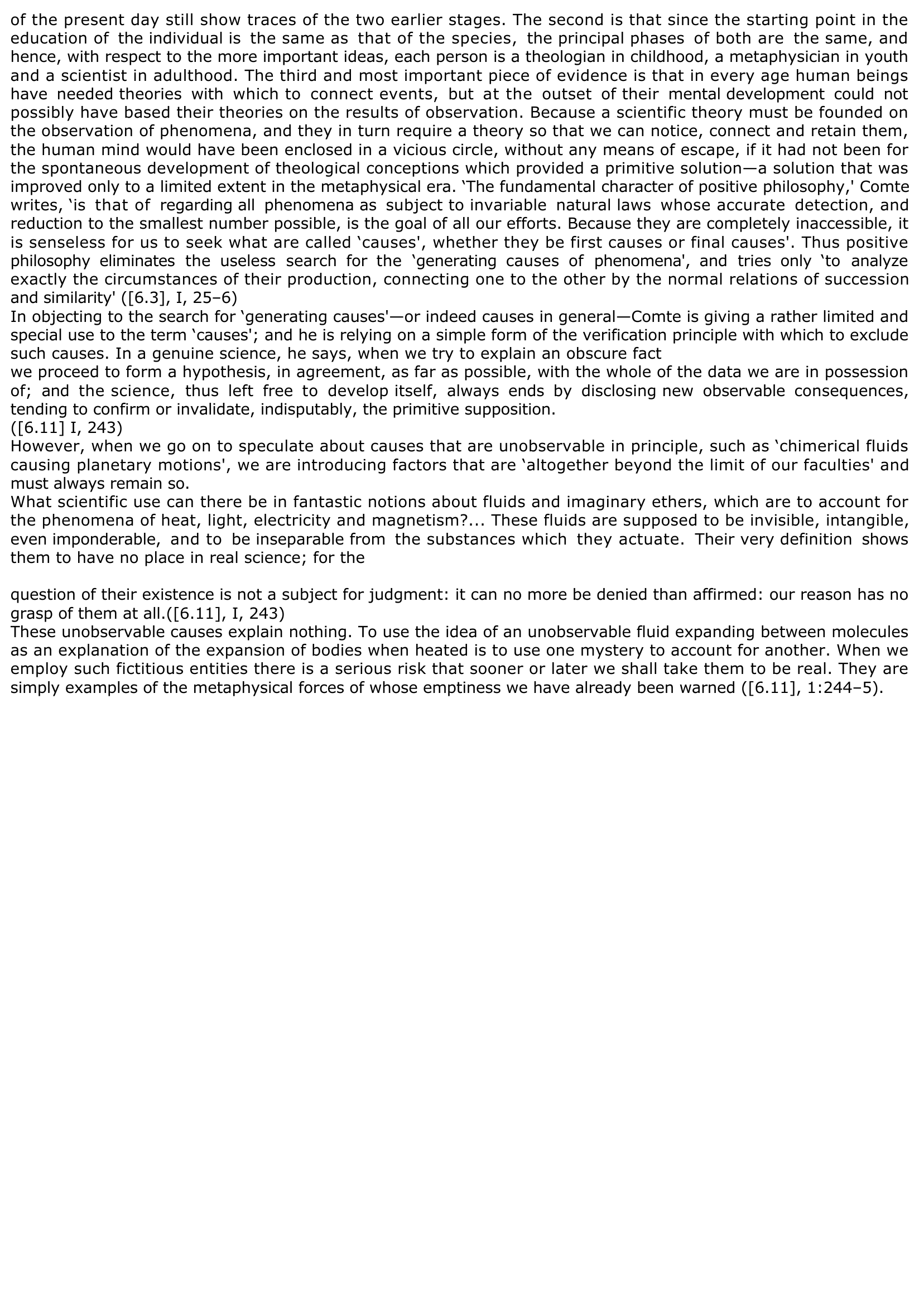Encyclopedia of Philosophy: THE LAW OF THREE STAGES - COMTE
Publié le 09/01/2010
Extrait du document

It is best to begin with the problem that troubled Comte: the disharmony he believed to exist between the backward state of the European social systems with which he was familiar and the advanced state of the scientific knowledge to which he had been exposed in the École Polytechnique. During this period its staff included Gaspard Monge, the originator of descriptive geometry; Louis Poisson, still one of the most famous of mathematical physicists; Gay-Lussac as the professor of chemistry; Ampère, as a chief contributor to electrodynamics; Cauchy, a creator of the theory of functions among many other achievements; and Fresnel, the pioneer of optical research. These were some of the men whose work, both theoretical and applied, was transforming the intellectual and material culture of Europe and was, in Saint-Simon’s and Comte’s view, also making obsolete the political systems within which it was being conducted. In his two early essays ‘A Brief Appraisal of European History’ (1820) and ‘Plan of the Scientific Operations Necessary for Reorganizing Society’ (1822), Comte suggested that the partnership of Catholicism and feudalism that had ruled Europe from the eleventh century was approaching its end. The prosperity of nations and the organization of their intellectual life no longer needed either a military society or its theological superstructure. The rise of industry and the positive—or experience-based—sciences could, and would, replace war and metaphysics as the unifying forces of the new social order. The development of this order could be encouraged if scientists transformed the pursuit of politics into a theoretical science with practical applications, a science that used historical laws to explain and, above all, predict the course of our social existence.

«
of the present day still show traces of the two earlier stages.
The second is that since the starting point in theeducation of the individual is the same as that of the species, the principal phases of both are the same, andhence, with respect to the more important ideas, each person is a theologian in childhood, a metaphysician in youthand a scientist in adulthood.
The third and most important piece of evidence is that in every age human beingshave needed theories with which to connect events, but at the outset of their mental development could notpossibly have based their theories on the results of observation.
Because a scientific theory must be founded onthe observation of phenomena, and they in turn require a theory so that we can notice, connect and retain them,the human mind would have been enclosed in a vicious circle, without any means of escape, if it had not been forthe spontaneous development of theological conceptions which provided a primitive solution—a solution that wasimproved only to a limited extent in the metaphysical era.
‘The fundamental character of positive philosophy,' Comtewrites, ‘is that of regarding all phenomena as subject to invariable natural laws whose accurate detection, andreduction to the smallest number possible, is the goal of all our efforts.
Because they are completely inaccessible, itis senseless for us to seek what are called ‘causes', whether they be first causes or final causes'.
Thus positivephilosophy eliminates the useless search for the ‘generating causes of phenomena', and tries only ‘to analyzeexactly the circumstances of their production, connecting one to the other by the normal relations of successionand similarity' ([6.3], I, 25–6)In objecting to the search for ‘generating causes'—or indeed causes in general—Comte is giving a rather limited andspecial use to the term ‘causes'; and he is relying on a simple form of the verification principle with which to excludesuch causes.
In a genuine science, he says, when we try to explain an obscure factwe proceed to form a hypothesis, in agreement, as far as possible, with the whole of the data we are in possessionof; and the science, thus left free to develop itself, always ends by disclosing new observable consequences,tending to confirm or invalidate, indisputably, the primitive supposition.([6.11] I, 243)However, when we go on to speculate about causes that are unobservable in principle, such as ‘chimerical fluidscausing planetary motions', we are introducing factors that are ‘altogether beyond the limit of our faculties' andmust always remain so.What scientific use can there be in fantastic notions about fluids and imaginary ethers, which are to account forthe phenomena of heat, light, electricity and magnetism?...
These fluids are supposed to be invisible, intangible,even imponderable, and to be inseparable from the substances which they actuate.
Their very definition showsthem to have no place in real science; for the
question of their existence is not a subject for judgment: it can no more be denied than affirmed: our reason has nograsp of them at all.([6.11], I, 243)These unobservable causes explain nothing.
To use the idea of an unobservable fluid expanding between moleculesas an explanation of the expansion of bodies when heated is to use one mystery to account for another.
When weemploy such fictitious entities there is a serious risk that sooner or later we shall take them to be real.
They aresimply examples of the metaphysical forces of whose emptiness we have already been warned ([6.11], 1:244–5)..
»
↓↓↓ APERÇU DU DOCUMENT ↓↓↓
Liens utiles
- Encyclopedia of Philosophy: THE CHARACTER AND ORGANIZATION OF THE SCIENCES - COMTE
- Encyclopedia of Philosophy: Albert the Great
- Encyclopedia of Philosophy: HYPOTHESES AND SOCIAL LAWS - COMTE
- Encyclopedia of Philosophy: THE TRANSCENDENTAL DIALECTIC: THE ANTINOMIES OF PURE REASON - KANT
- Encyclopedia of Philosophy: The Philosophes

































